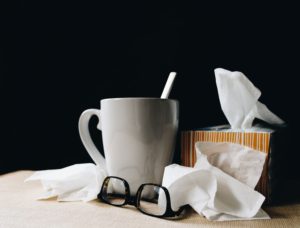So you’re feeling the winter “ick”…. now what?
*5 tips to get you back on your feet and feeling human again*

It’s that time of year, for the past few weeks A LOT of my patients have come in with a cough (or sore throat, or runny nose, etc.) and reporting they are just getting over “something” or it just started today.
And then the holidays hit.
Because of higher stress levels this time of year, and with the increased exposure to all the “sick” at work, I found myself with a sore throat and congestion.
Feeling the “ick” myself made me realize that there are a lot of therapies I implement immediately upon feeling the first symptoms of illness that I should share with my community, and so this blog was born.
Ultimately it’s going to happen to all of us, you are going to get sick, but it doesn’t have to be the end of the world. In fact, I dare say, it can actually be a good thing.
Think of getting sick like going to the gym for your immune system, it’s “in training” to react and respond to future illness. I know it’s hard to see the positive when you are feeling the “ick”, but with some of these simple at home recommendations you can be back to your old self quickly without compromising the beauty and wisdom of your immune system.
So without further ado, I give you my top 5 at home treatments for when you get the “ick”:

- Rest!
- The obvious point here is to do your best to take the time to sleep, and to try and sleep regularly. But what most of us overlook is to not let our day to day tasks and responsibilities (ie stress) get the best of us. Your world will not come crashing down around you if you take a day (or three) to rest and recuperate. In fact, your body and your co-workers will thank you for not spreading the “ick” and for taking the time to heal.
- Stay Hydrated
- In order for the cells of your immune system to circulate around your body properly and efficiently you need to be hydrated. Water would be the most direct way to stay hydrated, but you can also use broths or herbal teas which have the added bonus nutritional and medicinal value.
- Avoid sugar & alcohol
- There are many reasons to keep sugar intake to a minimum, but we are only talking about fighting illness here so more on that in a future post. Eating a sugary treat (soda, baked goods, refined carbohydrates, etc.) or alcohol sends your bacteria fighting cells in to a type of “sugar induced coma” for several hours after consuming. This combined with the pro-inflammatory state caused by regular consumption of these substances may contribute to decreased immune function and prolonged or worsened smptoms.
- Side note: Many people lose their appetite when they are ill, this is your body’s innate wisdom at work. Eating stresses your body and immune system by taxing your energy stores with digestion and can even confuse your immune system. If you are hungry when ill, or when your appetite returns, try to keep your diet simple and stick to light meals like the broths and tea I mentioned above.
- Take your vitamins
- My patients will tell you I am not a huge fan of generic multi-vitamins, I truly think we should all try and get most of our required nutrients from a well balanced diet of whole foods. But in the case of illness there can be supplements that are beneficial in priming your immune system and helping to fight infection.
- Vitamin D3 – Vitamin D affects many of our bodies systems, specifically it helps boost immune function to help prevent and fight infection. If you live a year round warm and sunny locale (lucky you) you may produce enough vitamin D on your own if you spend at least 15 minutes a day with arms, legs, and back exposed to the sun (no sunscreen or clothes). For the rest of us in North America (especially those of us North of the 45th parallel) we need to supplement. If you haven’t had your levels tested recently I recommend no more than 5,000 IU daily, to be taken with a fatty meal. Otherwise this is a good supplement to talk about with your naturopathic doctor to get the right dose for you.
- Vitamin C – I think this is a commonly known supplement for the “ick”, it works in several ways: as a potent antioxidant, supports barrier function against pathogens, as well as being a necessary nutrient in cellular function of your immune system. Higher doses are necessary to help fight illness though so you will likely need to look at supplementation. Vitamin C is pretty easy to get through your diet, and the RDA is pretty low at only 90mg. So if you are eating whole foods you shouldn’t have to supplement regularly. Most people think of citrus fruits as high in vitamin C, which come into season during the winter months, (coincidence… maybe, maybe not); but cruciferous veggies are also very high in vitamin C (broccoli, kale, brussels sprouts), and those guys come into season in the fall. Mother nature really does have a way to help boost our immune systems in advance!
- Elderberry – Ok, not a vitamin, but a very powerful “superfood” that is easily found in supplement form. Elderberry is high in the above mentioned vitamin C as well as TONS of assorted flavonoids which make it a very “antioxidant-rich” plant. Specifically for immune function, elderberry is a powerhouse, it has actually been studied to reduce the length of the flu. I usually recommend taking some form of an elderberry supplement semi regularly throughout the winter as prevention (ie immune support), and then bumping up the dose when staring to feel cold and flu symptoms. The really great news is that you have options with this one; don’t like capsules? You can find elderberry supplements as: chewable gummies, tinctures, syrups, glycerites, “tonics”, and yes even capsules.
- My patients will tell you I am not a huge fan of generic multi-vitamins, I truly think we should all try and get most of our required nutrients from a well balanced diet of whole foods. But in the case of illness there can be supplements that are beneficial in priming your immune system and helping to fight infection.
- Know when to seek medical attention
- Not every generic illness warrants a doctors visit, in fact the “flu” is a virus and cannot be treated with antibiotics, as are most “common colds”. But there are symptoms that should not be ignored, and then there are emergent symptoms. You should know when you NEED to seek medical attention, here is my list of times when you most certainly should seek attention:
- When to see your doctor:
- Symptoms of strep throat such as: severe sore throat, high fever, swollen lymph nodes, skin rash, red enlarged tonsils with white spots, drooling.
- Severe stomach pain with vomiting and/or severe diarrhea
Pain with urination accompanied by back pain, fever and/or shaking chills. - Elders or immunocompromised with any sign of infection, shortness of breath, urinary symptoms
- Severe pain in the lower abdomen
- Newborns (0-3 months) with a fever of 100.5℉ or higher
- Infants or children with a fever of 104℉ that does not respond to fever reducing therapies
- Fever in children of lasting more than 3 days
- Fever in adults over 101℉ that lasts over 3 days
- When to seek emergency care (GO to the hospital or dial 911!):
- Signs of meningitis – Severe headache, stiff neck, sudden onset of rash and/or changes in mental functioning (speaking funny, not making sense, hallucinating).
- A fever in anyone over 105℉ – this is the temperature that starts to cook the brain!
- Difficulty breathing or severe wheezing
- If someone has become unresponsive while sick.
- A child with a first time febrile seizure
I hope these are helpful for you and, most especially, you find them doable! I implemented these tips this past week when I felt a sore throat hit and I ended up clearing the “ick” pretty quickly to be up and running for all the merriment and family festivities of the holidays.
Bonus factoid: the first 4 of these recommendations are great everyday things to help boost your immune function to help prevent illness as well! So if you were to incorporate these lifestyle actions into your daily habits you may see a reduction in the amount of illness you see in yourself throughout the year, and/or experience shorter symptoms of illness when it does find you.
- Have you tried any of these at home recommendations? Or do you have other at home treatments you love and use regularly when you feel ill? I would love to hear about it in the comments below!
1 Cantorna MT, Snyder L, Lin YD, Yang L. Vitamin D and 1,25(OH)2D regulation of T cells. Nutrients. 2015;7(4):3011-21. Published 2015 Apr 22. doi:10.3390/nu7043011
2 Carr AC, Maggini S. Vitamin C and Immune Function. Nutrients. 2017;9(11):1211. Published 2017 Nov 3. doi:10.3390/nu9111211
3 Shahsavandi S, Ebrahimi MM, Hasaninejad Farahani A. Interfering With Lipid Raft Association: A Mechanism to Control Influenza Virus Infection By Sambucus Nigra. Iran J Pharm Res. 2017;16(3):1147-1154.





